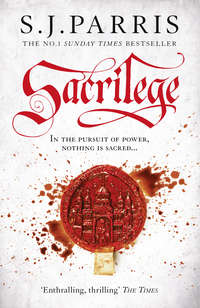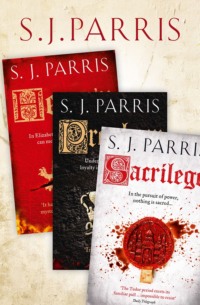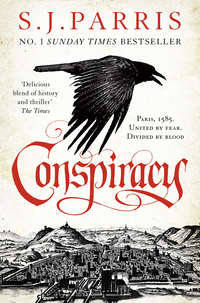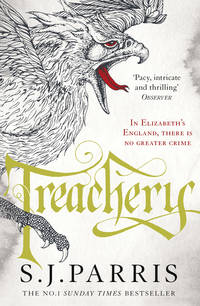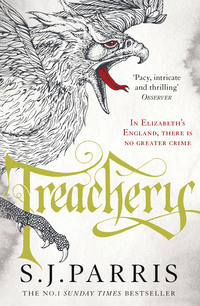
Полная версия
Heresy
At the steward’s nod, I stepped towards the man under the trees, who had turned to face me – or so I believed, for the late afternoon sun was slanting down directly behind him, leaving him silhouetted, a lean black shape against the golden light. I could not gauge his expression, so I paused a few feet away from him and bowed deeply in a manner I hoped was fitting.
‘Giordano Bruno of Nola, at your honour’s service.’
‘Buonasera, Signor Bruno, e benvenuto, benvenuto,’ he said warmly, and strode forward, holding out his right hand to clasp mine in the English style. His Italian was only faintly coloured by the clipped tones of his native tongue, and as he approached I could see his face clearly for the first time. It was a long face, made the more severe by the close-fitting black cap he wore over receding hair. I guessed him to be about fifty years of age, and his eyes were lit with a sharp intelligence that seemed to make plain without words that he would not suffer fools. Yet his face also bore the traces of great weariness; he looked like a man who carried a heavy burden and slept little.
‘A fortnight past, Doctor Bruno, I received a letter from our ambassador in Paris informing me of your arrival in London,’ he began, without preamble. ‘You are well known at the French court. Our ambassador says he cannot commend your religion. What do you think he could mean by that?’
‘Perhaps he refers to the fact that I was once in holy orders, or the fact that I am no longer,’ I said, evenly.
‘Or perhaps he means something else altogether,’ Walsingham said, looking at me carefully. ‘But we will come to that. First tell me – what do you know of me, Filippo Bruno?’
I snapped my head round to stare at him then, wrong-footed – as he had intended I should be. I had abandoned my baptismal name when I entered the monastery of San Domenico Maggiore and taken my monastic name of Giordano, though I had reclaimed it briefly while I was on the run. For Walsingham to address me by it now was clearly a little trick to show me the reach of his knowledge, and he was evidently pleased with its effect. But I recovered myself, and said,
‘I know enough to see that only a fool would attempt to hide anything from a man who has never met me, yet calls me by the name my parents gave me, a name I have not used these twenty years.’
Walsingham smiled.
‘Then you know all that matters at present. And I know that you are no fool. Reckless, perhaps, but not a fool. Now, shall I tell you what else I know about you, Doctor Giordano Bruno of Nola?’
‘Please – as long as I may be permitted to separate for your honour the ignominious truth from the merely scurrilous rumour.’
‘Very well, then.’ He smiled indulgently. ‘You were born in Nola, near Naples, the son of a soldier, and you entered the monastery of San Domenico Maggiore in your teens. You abandoned the order some thirteen years later, and fled through Italy for three years, pursued by the Inquisition on suspicion of heresy. You later taught in Geneva, and in France, before attracting the patronage of King Henri III in Paris. You teach the art of memory, which many consider to be a kind of magic, and you are a passionate supporter of Copernicus’s theory that the Earth rotates around the Sun, though the idea has been declared heretical by Rome and by the Lutherans alike.’
He looked at me for confirmation, and I nodded, bemused.
‘Your honour knows much.’
He smiled.
‘There is no mystery here, Bruno – when you stopped briefly in Padua, you became friends with an English courtier named Philip Sidney, did you not? Well – he is shortly to marry my daughter, Frances.’
‘Your honour could not have found a worthier son-in-law, I am sure. I shall look forward to seeing him,’ I said, and meant it.
Walsingham nodded.
‘As a matter of curiosity – why did you abandon the monastery?’
‘I was caught reading Erasmus in the privy.’
He stared at me for a moment, then threw back his head and guffawed; a deep, rich sound, such as a bear might make if it could laugh.
‘And I had other volumes on the Forbidden Index of the Holy Office. They would have sent me before the Inquisitor, but I escaped. This is why I was excommunicated.’ I folded my hands behind my back as I walked, thinking how strange it seemed to be reliving those days in this green English garden.
He regarded me with an inscrutable expression and then shook his head as if puzzled.
‘You intrigue me greatly, Bruno. You fled Italy pursued by the Roman Inquisition for your suspected heresy, and yet you were also arrested and tried by the Calvinists in Geneva for your beliefs, is it not so?’
I tilted my head, half-assenting.
‘There was something of a misunderstanding in Geneva. I found the Calvinists had only swapped one set of blind dogma for another.’
Again he looked at me with something approaching admiration, and laughed, shaking his head.
‘I have never met another man who has managed to get himself accused of heresy by both the pope and the Calvinists. This is a singular achievement, Doctor Bruno! It makes me ask myself – what is your religion?’
There was an expectant pause while he looked at me encouragingly.
‘Your honour knows that I am no friend of Rome. I assure you that in everything my allegiance is to Her Majesty and I would be glad to offer her any service I may while I remain under her sovereignty.’
‘Yes, yes, Bruno – I thank you, but that is not an answer to my question. I asked what is your religion? In your heart, are you papist or Protestant?’
I hesitated.
‘Your honour has already pointed out that both sides have found me wanting.’
‘Are you saying that you are neither? Are you an atheist, then?’
‘Before I answer that, may I know what the consequences of my answer might be?’
He smiled then. ‘This is not an interrogation, Bruno. I only wish to understand your philosophy. Speak frankly with me, and I will speak frankly with you. This is why we are walking here among the trees, where we will not be overheard.’
‘Then I assure your honour that I am not what is usually meant by the word “atheist”,’ I said, fervently hoping that I was not condemning myself. ‘In France, and here in her embassy, I call myself a Catholic because it is simpler not to make trouble. But in truth, I do not think of myself as Catholic or Protestant – these terms are too narrow. I believe in a greater truth.’
He raised an eyebrow.
‘A greater truth than the Christian faith?’
‘An ancient truth, of which the Christian faith is one later interpretation. A truth which, if it could be properly understood in our clouded age, might enlighten men instead of perpetuating these bloody divisions.’
A pregnant silence fell. The sun was low in the sky now, and in the shade of the trees the air was growing cool. Birdsong became more insistent with the gathering dusk, and Walsingham continued to pace through the grass, the shoulders of his black doublet flecked with white petals of blossom that fluttered from the branches overhead.
‘Faith and politics are now one and the same,’ he went on. ‘Perhaps it was always so, but it seems to have reached new extremes in our troubled century, do you not think? A man’s religion tells me where his political loyalties lie, far more than his place of birth or his language. There are many stout Englishmen in this realm with a greater love for Rome than you have, Bruno, or than they have for their own queen. Yet, in the end, faith is not merely politics. Above all else it is a matter of a man’s private conscience, and how he stands before God. I have done things in God’s name that I must justify before Him at the last judgement.’ He turned and fixed me with an expression of sorrow then. When he spoke again his voice was quiet and expressionless. ‘I have stood by and watched a man’s beating heart ripped from his living body at my command. I have coldly questioned men as their limbs were pulled from their sockets on the rack, and the very noise of that is enough to bring your stomach into your mouth. I have even turned the wheels myself, when the secrets that might spill from a man’s lips as he stretched were too sensitive for the ears of professional torturers. I have seen the human body, made in the likeness of God, forced to the very limits of pain. And I have visited all these horrors and more on my fellow creatures because I believed that by doing so I was preventing greater bloodshed.’
He passed a hand across his forehead then, and resumed walking.
‘Our nation is young in the new religion, and there are many in France and Spain who, with the backing of Rome, seek to kill Her Majesty and replace her with that Devil’s bitch, Mary of Scotland.’ He shook his head. ‘I am not a cruel man, Bruno. It gives me no pleasure to inflict suffering, unlike some among my executioners.’ He shuddered, and I believed him. ‘Nor am I the Inquisition – I do not imagine myself responsible for men’s immortal souls. That I leave to those ordained to the task. I do what I do purely to ensure the safety of this realm and the queen’s person. Better to have one priest gutted before the crowds at Tyburn than he should go free to convert twenty, who might in time join others and rise up against her.’
I inclined my head in acknowledgement; he did not seem to expect debate. Beneath the largest and oldest tree in the orchard a circular bench had been constructed to fit around its trunk. Here Walsingham motioned to me to sit beside him.
‘You are a man who knows first-hand the persecutions Rome visits on her enemies. The streets of England would run with blood if Mary of Scotland found her way to the throne. Do you understand me, Bruno? But these conspiracies to put her there are like the heads of the Hydra – we cut off one and ten more grow in its place. We executed that seditious Jesuit Edmund Campion in ’81 and now the missionary priests are sailing for England by their dozens, inspired by his example of martyrdom.’ He shook his head.
‘Your honour’s task is not one I envy.’
‘It is the task God has given me, and I must look for those who will help me in it,’ he said simply. ‘Tell me, Bruno – does the French king provide for you, other than your lodgings at the embassy?’
‘He supports me rather with his good opinion than with his purse,’ I said. ‘I had hoped to supplement my small stipend with some teaching. To that end I planned to visit the famous University of Oxford, to see if they might have some use for me there.’
‘Oxford? Indeed?’ he said, a spark of interest catching in his eyes. ‘Now there is a place mired in the mud of popery. The university authorities make a show of rooting out those who still practice the old faith, but in truth half the senior men there are secret papists. The Earl of Leicester, who is its chancellor, makes endless visitations and orders enquiries, but they scurry away like spiders under stones as soon as he shines a light on them. Then, once our backs are turned, they go on filling the heads of England’s young men with their idolatry – the very young men who will go on to the law and the church, and into public life. Our future government and clergy, no less, being turned secretly to Rome under our very noses. Her Majesty is furious and I have told Leicester it must be addressed with more vigour.’ He pressed his lips together, as if to suggest things would not be so lax if he were in charge. ‘The place has become a sanctuary for those who trade in seditious books, and most of these missionary priests coming out of the French seminaries are Oxford men, you know.’ Then he thought for a moment, and moderated his tone. ‘Yes, you should go to Oxford. In fact, I shall be glad to recommend you if you wish to visit. There is much you might see of interest.’
He paused as if contemplating some idea, then his thoughts appeared to land briskly elsewhere.
‘When you told me you wished to serve Her Majesty in any way she saw fit to use you – was this offer sincere?’
‘I would not make such an offer in jest, your honour.’
‘Her Majesty has money in her treasury for those willing to be employed under my authority, to aid in protecting her person and her realm from her enemies. And she would show her gratitude by other means as well – I know how important patronage and preferment can be to you writers. This would be the greatest service you could perform for her, Bruno – living at the French embassy, you will be privy to a great many clandestine conversations, and anything you hear touching plots against Her Majesty or her government, anything that concerns the Scottish queen and her French conspirators’ – he spread his arms wide – ‘letters you may glimpse, anything that you think may be of interest, no matter how small, would be of great value to us.’
He looked at me then, eyebrows raised in a question.
I hesitated.
‘I am flattered that your honour shows such faith in me—’
‘You have scruples, of course,’ he cut in, impatiently. ‘And I would think the less of any man who did not – I am asking you to present a false face to your hosts, and an honest man should pause before taking on such a role. But remember, Bruno – whenever you feel the wrench between conscience and duty, your care should always be for the greater good. The innocent among them will have nothing to fear.’
‘It is not quite that, your honour.’
‘Then what?’ He looked puzzled. ‘Philip Sidney told me you were so much an enemy of Rome that you would gladly join the fight against those who would bring the Inquisition to these shores.’
‘I am an enemy of Rome, your honour, as I am opposed to all who would tell men what to believe and then execute them when they dare to question the smallest part of it.’
I was silent for a moment while he regarded me through narrowed eyes.
‘We do not punish men for their beliefs here, Bruno. Her Majesty once eloquently declared that she had no desire to make windows into men’s souls, and no more do I. In this country, it is not what a man believes that will lead him to the scaffold, but what he may do in the name of those beliefs.’
‘What he may do, or what he can be proved to have done?’ I asked pointedly.
‘Intent is treason, Bruno,’ he replied impatiently. ‘Propaganda is treason. In these times, even distributing forbidden books is treason, because anyone who does so does it with the intent of converting those into whose hands they place them. And converting the queen’s subjects means seducing their loyalties away from her to the pope, so that if a Catholic force invaded, they would side with the aggressors.’
We sat in silence for a moment, then he placed a hand on my arm.
‘Here in England, a man of progressive ideas such as yours, Bruno, may live and write freely, without fear of punishment. That, I presume, is why you came here. Would you have the Inquisition return to threaten those freedoms?’
‘No, your honour, I would not.’
‘Then you will consent to serve Her Majesty in this way?’
I paused, and wondered how my answer would change my fortunes.
‘I will serve her to the best of my ability,’ I replied.
Walsingham smiled broadly then – I caught the glint of his teeth in the dusk – and clasped my hand between both of his, the skin dry and papery.
‘I am exceedingly glad, Bruno. Her Majesty will reward your loyalty, when it has been proved.’ His eyes shone. Around us the garden was almost in darkness, though a few streaks of gold light still edged the violet banks of cloud behind the trees, and the air had grown chill, the plants releasing sweet scents into the evening breeze. ‘Come, let us go inside. What a poor host I am – you have not even had a drink.’
He rose, with an evident stiffness in his back and hips, and began making his way over the grass.
A servant had lit a series of small lanterns along each side of the path through the knot garden, so that as we approached the house our way was lit by two rows of flickering candles; the effect was charming, and as I took a deep breath of the evening air I felt again an intimation of new possibilities, a future that I could grasp. The long days of travelling through the mountains of northern Italy, staying in filthy roadside inns infested with rats, where I would force myself to keep awake all night with one hand on my dagger for fear of being murdered for the few coins I carried, seemed very far distant; I was entering the intelligence service of the Queen of England. Another of my life’s unexpected turns, but part of the great map of my strange journey through the world, I thought.
Walsingham halted just before the lanterns and leaned towards me.
‘I will arrange for you to meet with my assistant, Thomas Phelippes,’ he said. ‘He organises the logistics – devises ciphers, delivery points for correspondence, that side of business. He is the most skilled man in England for breaking codes. I hardly need to say that you should not breathe a word of our meeting to anyone except Sidney,’ he added, in a low voice.
‘Your honour, I was once a priest – I can lie as well as any man.’
He smiled.
‘I rely upon it. You could not have outwitted the Inquisition for this long without some talent for dissembling.’
So it was that I became part of what I later learned was a vast and complex network of informers that stretched from the colonies of the new world in the west to the land of the Turks in the east, all of us coming home to Walsingham holding out our little offerings of secret knowledge as the dove returned to Noah bearing her olive branch.
A sudden crack of thunder overhead jolted me out of memory, back to the room where I sat pressed up against the rain-slick window of a royal palace, watching a courtyard illuminated by sheets of light. In England I had hoped to live peacefully and write the books that I believed would shake Europe to its foundations, but I was ambitious and that was my curse. To be ambitious when you have neither means nor status leaves you dependent on the patronage of greater men – or, in this case, women. Tomorrow I would see the great university city of Oxford, where I must ferret out two nuggets of gold: the secrets Walsingham wanted from the Oxford Catholics, and the book I now believed to be buried in one of its libraries.
TWO
We left for Oxford at first light the following morning on horses that Sidney procured from the steward at Windsor, fine mounts with elaborate harnesses of crimson and gold velvet, studded with brass fittings that jingled merrily as we rode, but we were undoubtedly a more solemn party than had set out the day before on the river amid music and gaily coloured pennants. The storm had broken but the rain had set in determinedly, the warmth had evaporated from the air and the sky seemed to sag over us, grey and sullen; it would have been impossible to travel by river without being half-drowned. The palatine was much quieter over breakfast and sat with his fingers pressed to his temples, occasionally emitting a little moan – Sidney whispered to me that this was the penance for a late night and prodigious quantities of port wine – and my mood was much improved accordingly. Sidney was cheerful, as his winnings from the night’s card games had grown steadily in direct proportion to the palatine’s drinking, but the weather had dampened our bright mood and we spent the first part of the journey in silence, broken now and again by Sidney’s observations of the road conditions or the palatine’s unapologetic belches.
To either side, the thick green landscape passed unchanging, bedraggled under the rain, the only sound the muted thud of hooves on the wet turf as Sidney drew his horse alongside mine at the head of the party and allowed the palatine to fall behind, his head drooping to his chest, flanked by the two bodyservants who attended him, their horses carrying the vast panniers containing Laski’s and Sidney’s finery for the visit. I had only one leather bag with a few books and a couple of changes of clothes, which I kept with me, strapped to my own saddle. By the middle of the afternoon we had reached the royal forest of Shotover on the outskirts of Oxford. The road was poorly maintained where it passed through the forest and we had to slow our pace so the horses would not stumble in the puddles and potholes.
‘So, Bruno,’ Sidney said, keeping his voice low, when we were out of earshot of the palatine and his servants, ‘tell me more about this book of yours, that has brought you all the way from Paris.’
‘For the last century it was thought lost,’ I replied softly, ‘but I never believed that, and all through Europe I met book dealers and collectors who whispered rumours and half-remembered stories about its possible whereabouts. But it was not until I was living in Paris that I found real proof that the book could be found.’
In Paris, I told him, among the circle of Italian expatriats that gathered around the fringes of King Henri’s court, I had met an aged Florentine gentleman named Pietro who never tired of boasting to acquaintances that he was the great-great-nephew of the famous book dealer and biographer Vespasiano da Bisticci, maker of books for Cosimo de’ Medici and cataloguer of the Vatican library. This Pietro, knowing of my interest in rare and esoteric works, recounted to me a story passed down to him by his grandfather, Vespasiano’s nephew, who had been an apprentice to his uncle in the manuscript trade during the 1460s, in the last years of Cosimo’s life. Vespasiano had assisted Cosimo in the collection of his magnificent library, making more than two hundred books at his commission and furnishing the copyists with classical texts, so that the book dealer became an intimate associate of the Medici circle, and in particular a friend of Marsilio Ficino, the great humanist philosopher and astrologer whom Cosimo had appointed head of his Florentine Academy and official translator of Plato for the Medici library. As Pietro’s grandfather, who was then the young apprentice, told it, one morning in 1463, the year before Cosimo died, Ficino came to visit Vespasiano at his shop, clearly in a state of some distress, clutching a package. He, Ficino, had already begun work on the Plato manuscripts when he had received word from his patron that he must abandon them and turn his attention as a matter of urgency to the Hermetic writings, which had been brought out of Macedonia some three years earlier by one of the monks Cosimo employed to adventure overseas in search of books from the libraries of Byzantium, but which had yet to be examined. Perhaps Cosimo knew he was dying and wanted to read Hermes more than he wanted to read Plato in the last days of his life, I can only speculate. In any case, the story goes that Ficino told Vespasiano, ashen-faced and trembling, that he had read the fifteen books of the Hermetic manuscript and knew that he could not fulfil his commission. He would translate for Cosimo the first fourteen, but the final manuscript, he said, was too extraordinary, too momentous in its import, to put into the language of men hungry for power, for it revealed the greatest secret of Hermes Trismegistus, the lost wisdom of the Egyptians, a secret that could destroy the authority of the Christian church. This book would teach men nothing less than the secret of knowing the Divine Mind. It would teach men how to become like God.
Ficino had brought this devastating Greek manuscript to the shop with him, carefully wrapped in oilskins; here he handed it over to Vespasiano, exhorting him to keep it safe until such time as they could decide what should be done with it while he, Ficino, would tell Cosimo that the fifteenth book had never been brought out of Byzantium with the original manuscripts. This was the plan, and the remaining books were duly translated; after Cosimo died the following year, Ficino and Vespasiano met to discuss the fate of the fifteenth book. Vespasiano saw the opportunity for profit and favoured selling it to one of the wealthy monastic libraries, where experienced scholars would know how to keep it safe from the eyes of those who might misinterpret or abuse the knowledge it contained; Ficino, on the other hand, had begun to regret his earlier delicacy and wondered whether it might not be better to translate the book after all, bringing its secrets into the light by revealing them first to the eminent thinkers of the Florentine Academy, the better to debate the impact of what was effectively the most blasphemous heretical philosophy ever to be uttered in Italy.


